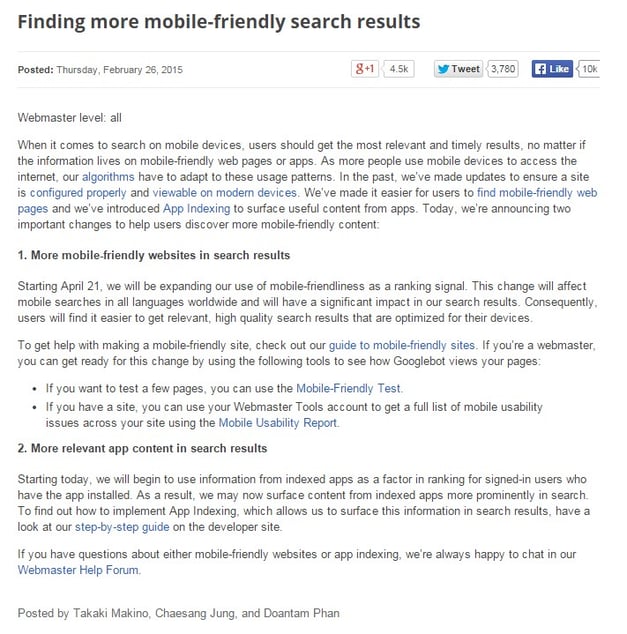Google, You’ve Done it Again
 Today is the day that Google will change its algorithm to favour ‘mobile friendly’ websites.
Today is the day that Google will change its algorithm to favour ‘mobile friendly’ websites.
The news that this was coming isn’t new but I thought to mark today's update I would summarise what that means to your website and why you, a B2B marketer, should care.
Let’s go back in time (26th of February 2015) when Google published the following post on their Webmaster Central Blog:

The above pretty much says that your chances to rank for a search query on a mobile device are starting to look pretty slim if your site isn’t mobile optimised.
Why is Google doing this?
Well it’s pretty straight-forward, mobile (and that means mobile and tablets) search has been on a steady climb for years now and it’s pretty obvious that its counterpart is not able to keep up and it’s only a matter of time before mobile will be the primary device for all searches. This doesn’t mean that you should ditch your desktop website but it means that you MUST consider your customers using a mobile to search your product, service or company.
This is the case for every business: B2B and B2C.
Now, Google’s mission is to support and help its users by ensuring that you (the user) get the best search results possible when searching on a touchscreen device. And I am actually thankful for this because:
- We’ve been educating our clients for quite some time about the importance of having a mobile friendly site, this should be the nail in the coffin to offer a convincing argument.
- The search experience: There is nothing worse than searching for something with your smart phone and then trying to navigate around a site intended for a ‘desktop screen’. Try it! I bet you won’t last long.
So how does this affect my website?
Assuming that you already have a mobile friendly site, it might have a positive impact on your traffic. Especially if some of your competitors don’t. That means that you might score a better position in the search results which could lead to more traffic and perhaps to more leads … and you don’t even have to do anything.
Assuming that your site is not mobile friendly, it might have a negative impact on your mobile traffic. You might lose some of your rankings or even drop off completely from the search results page. In the long term, it might even affect your desktop search rankings, if you keep getting negative user signals (high bounce rates due to bad user experience from you site etc).
But don’t panic
Firstly, if you are not sure if your site is mobile friendly, you can do a quick check here. And if that doesn’t help, speak to your agency or internal team.
Secondly, if you haven’t already put a plan in place to make your site mobile friendly – do it (quickly). The last thing you want is to have Google on your bad side.
Lastly, be smart about the transition if you are responsible for a large website. Use your web analytics first and look at your mobile traffic and see which pages are receiving the most mobile traffic. You should prioritise those (and some key pages like your home page and your contact us form) over any other pages. You could also look at the overall number of templates and get them updated one after another, again prioritise the most valuable pages for mobile visitors first.
My conclusion
Sometimes there is still the perception that mobile friendly website is a nice to have and not a must have. All too often agencies design beautiful looking websites for a desktop not considering how they will work (and function) on a mobile. But let me make this clear, you and your agency should always consider mobile and the experience on such devices.
In addition, always listen to what your customers have to say – look at your data, look at any existing research, think about the intended user journey and the purpose of a page. As so often in advertising there is no ‘one solution’ fits all approach but it’s pretty clear that mobile should be very high on your digital marketing to do list if it isn’t already.
What do you think? What are your challenges or success stories? Let me know in the below.
